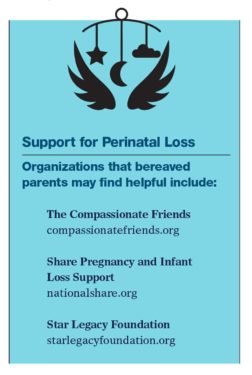Finding resilience after the devastation of perinatal loss
Oak Park resident Lyndsi James* was just shy of 39 weeks pregnant with her second child in February 2013. Hagen’s room was ready, decorated with cars, trucks, airplanes and a letter “H” that his 3-year-old sister, Genevieve, had painted for him.
Lyndsi’s doctor said that Hagen could be born anytime— maybe even today, on Lyndsi’s birthday. When Lyndsi noticed she wasn’t feeling Hagen move as much as usual, her nurse told her to go to the hospital for a routine check. Genevieve was excited to hear her brother’s “heart beep” again.
The resident at the hospital scanned Lyndsi’s belly repeatedly with the ultrasound wand and finally spoke. “I’m really sorry,” she said. “I don’t see a heartbeat.” Hagen had apparently suffered an umbilical cord accident. The cord had suddenly knotted, instantly ending his life.
Lyndsi was induced and delivered her son the next day. Hagen was 22 inches long, weighed 6 pounds and 4 ounces and had long, skinny fingers like his big sister.
“They wiped him off and handed him to me. He was so beautiful and perfect — but silent,” Lyndsi remembers. She, her husband Mark and their parents only had a few hours with Hagen — to hold him, take some pictures and make tiny handprints and footprints. They had him baptized. And the next day they left the hospital without their son, to start lives that would forever be different.
Pregnancy is supposed to be an exciting, joyful time, but perinatal losses can occur at any time during pregnancy and birth and are often devastating for expectant parents. Yet, these losses aren’t openly discussed, which can magnify grieving parents’ pain. Recognizing the depth of this kind of loss is the first step to help bridge this gap.
Misunderstood and marginalized
Perinatal loss describes the loss of a pregnancy or the death of a baby at any point during pregnancy or around the time of delivery, says psychotherapist Joey Miller, LCSW, of Wellsprings Health Associates in Chicago. And while it’s common — as many as 10% to 15% of confirmed pregnancies are lost, according to the U.S. Office on Women’s Health — the impact is often overlooked or downplayed.
“Perinatal loss is something that’s not talked about very much, so people often feel very alone with their grief,” says Nikki Lively, LCSW, clinical director of the Transitions to Parenthood program at The Family Institute at Northwestern University. “It’s also tricky to know how to support someone who has experienced it, because there is nothing anyone can say to make someone feel better. It’s about knowing how to be present with their pain without trying to make it better.”
It’s the loss of a relationship that began in the parent’s mind and heart … whether the baby’s been born yet or not.”
Part of the reason we’re uncomfor-table is that, as a culture, we’re uneasy dealing with grief or negative emotions — we want to move past them or “fix” them as quickly as possible.
“Often times there is a mixed message of, ‘I want to be supportive, but hurry up and grieve because I don’t necessarily know what to say or do and am uncomfortable,’” Miller says. “Perinatal loss remains misunderstood and minimized. Everyone knows that death is part of life, but children, especially babies, are not supposed to die before their parents. It’s jarring and unfair. It goes against the natural order of life, and it’s just plain wrong.”
And when a woman suffers a perinatal loss, especially early in pregnancy, others may not understand the depth of pain that she and her partner feel. “Even though people might use different words to describe the loss at different stages of pregnancy [like miscarriage], it’s still the loss of a baby,” Lively says. “It’s the loss of a relationship that began in the parent’s mind and heart that they have lost, whether the baby’s been born yet or not.”
While the unexpected loss of a full-term, healthy baby may seem the cruelest blow of all, grief doesn’t necessarily reflect the length of gestation, but rather the depth of the attachment you feel to your child, Miller says.
Overlooking that — or saying things that are meant to help (“It’s God’s will” or “You can get pregnant again”) — can make parents feel more isolated. Losing a baby before you even meet and hold that infant means you have no memories of that child’s life to comfort you later — only loss. Loss of the future, of your hopes and dreams for that child.
Supporting those experiencing loss
So what can family members and friends do? “Step up. Show up,” Miller says. “Say something — it doesn’t have to be perfectly articulated. Say, ‘I’m sorry. I’m here. If you want to talk, I’m willing to listen.’ When people say nothing, it can be interpreted as ‘I don’t care.’”
While grief is highly individual, a therapist or support group can help parents navigate their emotions and upended lives. “I don’t think there’s such a thing as ‘getting over’ losing a baby,” Miller says. “I think it’s something people can learn to live with.” Figuring out how to do that as time goes on depends on the individual.

“Other people may not have understood, but that was all we had of him,” Lyndsi says. They carefully dismantled Hagen’s room and created a dinosaur-themed room for their third child, Hugh, who was born in October 2014. (Their daughter, Priscilla, was born in August 2016.) There are pictures of Hagen in various rooms throughout the house, and Lyndsi and Mark talk about him with his siblings.
After all, “He was and is our son,” Lyndsi says. “He was and is a part of our family.” While every parent handles grief differently, for Mark and Lyndsi it’s important that Hagen not be forgotten. “Even today, I truly appreciate when people take the time to talk about him — and having other people say his name,” she says.
Hagen Jeffrey James. You were, and always will be, loved.
*Lyndsi James is the writer’s sister-in-law.
Above image: Lyndsi James holds a photo book of her son Hagen. Photo by Jim Vondruska. Originally published in the Spring/Summer 2020 issue.

Kelly K. James is a longtime freelancer who covers health, fitness and wellness topics from Downers Grove, where she lives with her family.










